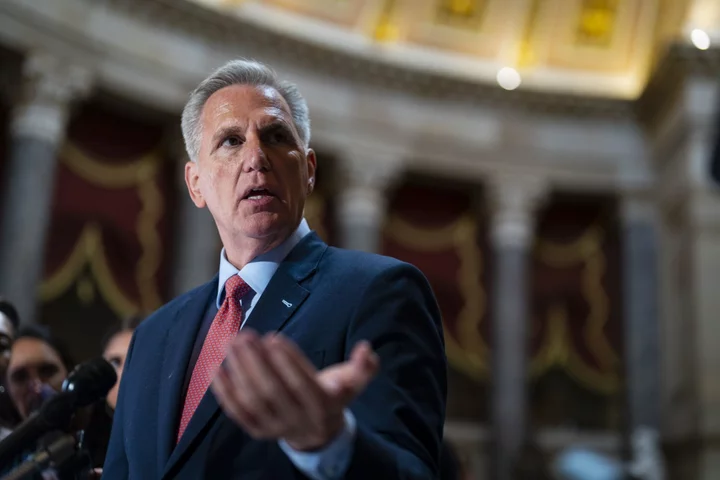House Speaker Kevin McCarthy’s optimism that White House and GOP negotiators would reach a deal in time to avert a potentially catastrophic default didn’t mollify analysts as the US was put on a ratings watch late Wednesday.
The California Republican said after a four-hour meeting between his and President Joe Biden’s hand-picked negotiators that a deal was possible before June 1, the date by which Treasury Secretary Janet Yellen has warned the US could run out of money to pay its bills.
“I still think we have time to get an agreement, and get it done,” McCarthy said after the meeting concluded.
Hours later, Fitch Ratings placed the United States’ AAA credit rating on watch, a sign of growing unease about the country’s ability to avert a first-ever default. The US received a credit downgrade during similar turmoil in 2011.
Fitch still expects a resolution to the debt limit before the June 1 so-called “X-date.”
Read More: US AAA Credit Rating May Be Cut by Fitch on Debt-Limit Impasse
US stocks are showing increasing signs of concern over the standoff, with the S&P 500 index down 0.7%, on Wednesday after a 1.1% slump on Tuesday. In the Treasuries market, investors are demanding ever-higher premiums on bills that mature when the government is seen most at risk of default. Rates on Treasury bills due June 1 on Wednesday briefly surpassed 7%, comparable to yields on junk debt.
A White House spokesperson said the Fitch report demonstrated the urgency of reaching a speedy resolution to the debt ceiling standoff.
And a Treasury Department spokesperson, Lily Adams, said in a statement that “tonight’s warning underscores the need for swift bipartisan action by Congress to raise or suspend the debt limit and avoid a manufactured crisis for our economy.”
On Capitol Hill, House Democratic Whip Katherine Clark blamed Republican “hostage-taking” for risking the US credit rating.
“Even the ratings watch is going to cause economic problems,” she told reporters at the Capitol Wednesday night. “This is the beginning.”
Representative Pramila Jayapal, chairwoman of the progressive caucus, said “This is the reality of what Republicans are driving us to, crashing the economy.”
McCarthy’s office had no response on Wednesday night to a request for comment on Fitch’s action.
A person familiar with the talks said no additional negotiations were planned for Wednesday night.
Representatives for Biden and House Republicans began meeting about noon in White House Budget Director Shalanda Young’s office suite. The change in locale came a day after Republican Patrick McHenry, one of McCarthy’s negotiators, bragged that the talks have all been held in the Capitol because, in his view, the GOP has the upper hand.
Yellen said earlier Wednesday that the world is just seeing the beginnings of the potential market stress if the debt crisis continues.
Read more: Any Debt Deal Still Faces Time-Consuming Hurdles in Congress
JPMorgan Chase & Co. chief US economist Michael Feroli wrote to clients Wednesday warning that his team now puts the odds of hitting the June 1 “X-date” without a deal “at around 25% and rising.”
Yellen said the Biden administration’s focus is on completing a debt-limit deal rather than contingency planning for a default.
“We are committed to not having missed payments and raising the debt ceiling,” Yellen said Wednesday via video conference to a Wall Street Journal event in London.
House Republicans have escalated their accusations that Biden lacks urgency in negotiations, while a Democratic aide called McCarthy unwilling to compromise across a wide spectrum of disputed points, threatening the legislative prospects of a deal.
House Democratic leader Hakeem Jeffries drew his own red line and said Democrats would only support a two year spending cap deal if the debt ceiling increases was two years.
Read more: Yellen Says Treasury Pushing for Deal, Not Prepping for Default
It is not unusual for Congress to strike budget deals at the last minute when the pressure becomes great enough to force negotiators to make painful choices.
House lawmakers are expected to leave town on Thursday for the Memorial Day holiday weekend. Republican leaders have asked that they be able to return on 24 hours’ notice, if a vote is called.
If a default did occur, economists project it could send the US into a recession, with widespread job losses and higher consumer borrowing costs spilling into the coming election year.
“The current standoff over the US debt ceiling has the potential to wreak more havoc on the economy than any previous go-around,” wrote Bloomberg Economics chief economist Anna Wong.
--With assistance from Anna Edgerton, Matthew Boesler, Steven T. Dennis and Jarrell Dillard.
(Updates with White House, Treasury, starting in seventh paragraph.)
Author: Erik Wasson, Billy House and Ari Natter

